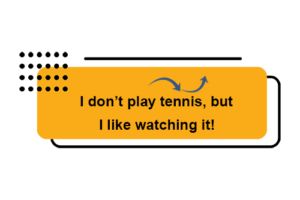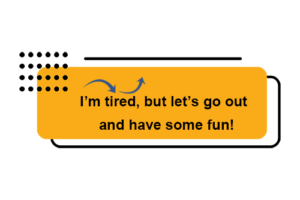Learning a language is one thing, improving your pronunciation is another. As you learn a language, it is necessary to practice your pronunciation to sound more like a native speaker! In this article, I am going to teach you some easy and effective English pronunciation exercises and learn how to practice English pronunciation.
1. Word stress in English pronunciation practice
What is word stress, and why does it matter in English pronunciation? The beauty of the English language is that it is not flat. It has rhythm both at word level and sentence level. Rhythm at word level is called “stress”. Each word in English has stress on one syllable. When the stress is on a particular syllable, what does it mean? It basically means that you have to read that syllable with a louder voice! You must emphasize that syllable. Let me give you some examples:
Politics:
This word has three syllables: Po.li.tics
The stress is on the first syllable. So, it should be pronounced louder than the other 2 syllables.
Political:
This word has four syllables: Po.li.ti.cal
The stress is on the second syllable. So, it should be pronounced louder than the other 3 syllables.
Politician:
This word has four syllables: Po.li.ti.cian
The stress is on the third syllable. So, it should be pronounced louder than the other 3 syllables.
Now, here is a question. There are like millions or words in English, right?! How should we know where the stress is?! That, my friends, is where online dictionaries come into play!
How to check word stress using a dictionary
To check word stress, you need to use an online dictionary, or perhaps a dictionary app on your smartphones! I always use Cambridge Online Dictionary. Now, let me show you how this works:
Imagine you want to see the word stress on the word “competitive”. I even don’t know how many syllables it has! So, let’s look it up in the dictionary:
As you can see, this word has 4 syllables. So, where is the stress? Do you see that little apostrophe before “pet”?
That is the sign of word stress! Basically, when you see this sign, that means the NEXT syllable is stressed. So, let me show you which syllable needs to be pronounced louder that the others:
This is how you can find word stress using a dictionary! Now, let me tell you something else:
Sometimes, words have different stresses in British or American accents. For example, let’s look up the word “advertisement” in our online dictionary:
As you can see, British people put stress on the second syllable, while American people stress the third syllable. So this is another thing to have in mind when looking up a word in a dictionary. Think about which accent you would like to have, and try to check the correct word stress. We will talk more about accents in the rest of this article, so keep reading!
2. Sentence intonation in English pronunciation practice
As I said earlier, English has rhythm in both words and sentences. Rhythm on words is called stress, but what about the rhythm of sentences? That is what we call “intonation”.
Intonation is the melody of spoken English. It is the way in which your voice rises and falls as you speak. Sentences in English can have 3 main patterns of intonation:
Falling intonation: this pattern is used when we are certain of something, or when something is done and completed.
This implies that I am certain that I have to work!
I tried really hard, but I couldn’t. The action is now complete!
Rising intonation: Another pattern is rising intonation, which is very common in Yes/No questions:
Fall-rise intonation: Another pattern of intonation is called fall-rise intonation. It has a fall, and then is followed by a rise. This pattern is used when our sentence is not yet complete, and we would like to continue! For example:
3. Speech shadowing (imitation technique)
Another very good English pronunciation practice is called “speech shadowing” or “imitation technique”. Now, don’t worry about the fancy name! It is actually very easy! Let me tell you how this works:
Step 1: Choose your accent
It is very important to know what accent you want to practice with. Is it American or British? But why does it matter? Well, remember word stress? As I said earlier, word stress can be different in British and American accents. Therefore, it is necessary to know which accent you want to have! Now, here is another question: Which one is better? American or British?
The answer is: none! There is no better accent. Choosing an accent is a personal preference. Which one do you like? That should be the one you practice with!
Step 2: Choose a role model
For the speech shadowing technique, you need to choose a native speaker as your role model! For example, I love the way former US president Barack Obama talks! It is so clear and really easy to understand. He also speaks my favorite accent which is American. Now, maybe you like the British accent, so I recommend Chef Ramsey! Or if you are into Australian accents, who is better than Thor, god of thunder! (I am clearly talking about the one and only Chris Hemsworth). Speaking of movies, don’t forget to read this article on how to describe movies in English!
Step 3: shadow
Now is the time to practice, but how? Download a video of your role model in which he/she is giving a speech. For example, I like this video of Obama.
What you should do is basically play the video, listen carefully, pause after each sentence and then, repeat what he/she said! You will be like a shadow, following a person and doing what they do! That is why it is called shadowing technique. So play, listen, pause and repeat. That’s it!
This is a very important English pronunciation practice.
4. Listen to podcasts
English pronunciation is directly connected with English listening skill. The more you listen, the better you can pronounce. However, the question is what should I listen to? Well, you can listen to anything as long as it is in English, such as music, radio, etc. However, the best resources you can use are English podcasts. Again, here it is very important to know what accent you want to have. American or British? For each of these accents, I have 2 recommendations:
BBC 6-minute English podcast: This podcast is created by the educational division of the British Broadcasting Channel (BBC) which is called “BBC learning English” and it has been very successful! Their Instagram page has nearly 4 million followers, and their YouTube channel has around 5 million subscribers! They produce amazing educational podcasts with a British accent. So, if you are a fan of the British accent, this is for you! Simply, go to their website and check out their podcasts.
VOA American English podcast: For American accent lovers like myself, I highly recommend VOA (Voice of America). Like BBC, VOA is a news agency but they are also active in English teaching. Their Instagram page has around 150 thousand followers, and their YouTube channel has more than 2 million subscribers. They also produce brilliant podcasts for different levels of beginner, intermediate and advanced. Check their website for podcasts and more!
5. Record your own voice
Another amazing yet underrated pronunciation practice is recording and listening to your own voice. You might ask how this pronunciation practice can be helpful? Well, there are a few reasons why listening to your own voice can be helpful:
You sound different in your head compared with when you hear yourself: I have had many students who were shocked when I played their voice for them! This is because when you are speaking, you hear yourself from the first-person viewpoint. However, when you hear your own voice, you can analyze it from a third-person point of view. Many people don’t understand their mistakes or pronunciation problems when they speak, but will immediately notice the errors when they listen to themselves! So, hearing your own voice can help understand your errors better.
You can mix this technique together with speech shadowing: When you practice your English pronunciation with the speech shadowing technique, you can record your own voice. But this time, instead of just listening to it, you can compare it with that of your role model! In this way, you can see which words are you mispronouncing, which word stresses are you getting wrong and how your intonation compares with that of your role model.
You can send your recorded voice to your teacher: This is also very helpful, especially for IELTS students who want to practice for the speaking part of IELTS. You can answer a question, record your voice, and send it to your teacher for feedback on your pronunciation and accent.
Improve Word Stress – Exercises with Videos & Voice Recorders
Word Stress in English is one of the most challenging areas for many non-native speakers.
But there’s good news. This is mostly because people simply haven’t learnt what they need to know to master good word stress in English.
This page explains everything you need to know about English word stress. It will give you clear steps to follow to improve your word stress in the RIGHT WAY, starting from right now!
If you approach improving English word stress in the right way you will see your English clarity, stress and rhythm improve over a matter of weeks.
What is Word Stress in English? Every multi-syllable word in English has one stressed syllable. This syllable is slightly higher and stronger than other syllables. Word stress makes the rhythm of English. To speak clearly in English you need to use correct word stress.
Here are some word stress examples:
rePORT – the ‘PORT’ is the stressed syllable.
MEdical – the ME is the stressed syllable.
eXAMple – the XAM is the stressed syllable.
Let’s look at that more closely.
What Is English Word Stress (definition)?
In English, not every syllable of a word has the same amount of emphasis or stress. In every English multi-syllable word there are stressed syllables and unstressed syllables.
So, what do you need to know about stressed syllables?
There is one stressed syllable in every multi-syllable word in English.
The stressed syllable:
- is slightly higher in pitch (or tone)
- has a full vowel (in unstressed syllables the vowel is often weaker)
- does not change – it is always the same for that particular word (there are a few exceptions to this. Read more further down the page).
- gives a beat when it’s in a sentence.
Listen To Word Stress Examples
It’s likely you are already quite good at hearing word stress in English. You’ll be better at it than you think! You just probably haven’t paid much attention to it before. It’s time to start developing your ability to hear word stress.
The tricky part is hearing it in real speaking AND of course, making it in your own speaking. But it starts with listening!
Practise listening to word stress examples below.
It’s very important that you can hear the word stress, the up and down of the voice to mark the stressed syllable in English.
Listen below and then record your own stress with the voice recorder.

Listen to Word Stress Examples.
Click to listen to the native speaker.
Listen carefully to the pitch of the voice.
Can you hear that the pitch is slightly higher for the stressed syllable in each word?
You might need to play and listen a few times.
Why Is English Word Stress Important? VERY IMPORTANT : )
English speakers use the word stress you make to recognise the words you say.
Research shows that listeners rely A LOT on the pitch and rhythm of a word to recognise it.
So, when you make word stress that is different to what they are expecting, it can mean that they don’t understand it.
In other words if you aren’t using good word stress it gives your listener more work to do and it can result in them not understanding what you say easily.
So, “why is English word stress so important?”. Using good word stress in English is very important because listeners use it to recognise the words you say. To speak clear English that people understand easily, you need to use good word stress. This means putting stress on the correct syllable and using enough stress so your pitch is not too flat.
Better English word stress makes a person’s spoken English clearer and more engaging to listeners.
In English, the position of the stress can change the meaning of a word.
For example, ‘PROject’ with the stress on the first syllable is a noun, for example you might say “I FInished my PROject’.
If you put the stress on the 2nd syllable of ‘proJECT’ it is a verb. So you might say “This is our proJECted OUTcome”.
If you use flat stress, so a similar amount of stress on each syllable, it will be difficult for listeners to instantly recognise. Especially when there is background noise or other pronunciation differences too.
How To Improve Your Word Stress
Here are some clear steps to follow for improving your English word stress.
1] LISTEN FOR WORD STRESS.
The first step in all this is becoming better at hearing word stress. If you can’t hear it – you won’t be able to make it.
Pay attention to the up and down, or the pitch or tone of native speakers voices when they are speaking. The more you listen, the more you’ll pick up that they don’t use a flat tone or an even rhythm.
Their pitch rises slightly to mark the stressed syllables and this is what makes the rhythm of English. This takes some practise to hear.
Be patient but listen carefully and you’ll start to hear it more easily over time.
2] USE THE WORD STRESS EXERCISES & VIDEOS BELOW
Use the Word Stress Videos and Voice Recorders below. These videos will help you learn to hear English word stress and practise making better word stress. Hearing word stress can take time and practise – be patient and keep focusing on it. The more you practise and actively listen for word stress, the better you will get at hearing it.
With these word stress exercises and English word stress videos you’ll correct many commonly mispronounced words. Non-native speakers often put the stress on the wrong syllable in the words that are covered in these word stress videos.
3] KEEP ACTIVELY LISTENING AND PRACTISING
Keep thinking about and focusing on word stress in multi-syllable words and your word stress will keep improving. Each time you learn a new multi-syllable word, make sure you look at the IPA to check where the word stress is. See more on that below.
Some tips as you go through these English Word Stress exercises:
– DO focus on pitch.
– Do not aim to make the stressed syllable louder. This results in unnatural sounds speech.
– DO NOT look for short cuts. Develop your ability to hear it and then practise making it. Through building these skills and actively working on it and listening for it you will get a feel for the ‘music’ of English.
Word Stress Exercise & Video 1
occur, maintain, maintenance, strategy, strategic
Watch the video and practise out loud while focusing on the pitch / tone of your voice.
Pay careful attention to the one stressed syllable in each word. It’s higher and the other syllables are lower and weaker.
Then record your own word stress with the voice recorder on the right.
Watch the video on the left to practise: occur, maintain, maintenance, strategy, strategic.
Record the words while focusing on your pitch. It should rise slightly to mark the stressed syllable.
Word Stress Exercise & Video 2
capable, capacity, initiate, initiative and entrepreneur
Watch the video and practise out loud while focusing on the pitch / tone of your voice.
Pay careful attention to the one stressed syllable in each word. It’s higher and the other syllables are lower and weaker.
Then record your own word stress with the voice recorder on the right.
Watch the video to practise the words: capable, capacity, initiate, initiative and entrepreneur
Record the words while focusing on making good word stress. Your pitch should rise slightly to mark the stressed syllable.
Word Stress Exercise & Video 3:
purchase, promise, technical, technique, technology
These words are OFTEN mispronounced by non-native speakers. Watch the video and say the words out loud focusing on pitch / tone.
Pay careful attention to the one stressed syllable in each word. It’s higher and the other syllables are lower and weaker.
Then record your own word stress with the voice recorder on the right.
Watch the video to practise: purchase, promise, technical, technique, technology
Record the words while focusing on making good word stress.
Word Stress Exercise & Video 4:
establish, specific, stable, politics, political, politician
Many non-native speakers mispronounce these words. Check your stress and vowel sounds with this word stress video.
Pay careful attention to the one stressed syllable in each word. It’s higher and the other syllables are lower and weaker.
Then record your own word stress with the voice recorder on the right.
Watch the video on the left to practise the target words: establish, specific, stable, politics, political, politician
Record the words while focusing on making good word stress.
Why Is Word Stress So Challenging?
If you speak English as a 2nd language, English word stress can be challenging because:
1] it’s different to the stress and rhythm of your first language
and
2] you can’t tell where the word stress is by looking at an English word (by the spelling)
Here are some ways that English word stress is different to the word stress and rhythm of other languages.
In some languages, each syllable gets the same amount of stress. So they don’t have stressed and unstressed syllables like English does.
In some languages, there are stressed syllables but they aren’t important and don’t change the meaning of a word.
Some languages have stressed syllables but the stressed syllables are simply made longer, instead of higher in pitch like they are in English.
Many languages don’t have weak vowels like in English. English has stressed and unstressed syllables and the vowels in the unstressed syllables often become weak.
All these variations make word stress challenging for non-native speakers to master.
The word stress exercises and word stress videos above will help you improve and develop your English word stress.
English Word Stress Rules
Some teachers will try and teach you word stress rules. This is dangerous! While it will make you feel like things are easier it will simply result in mispronunciations.
I spend a lot of time correcting students that have learnt rules with a previous teacher – and those rules are resulting in mispronunciations.
Do not follow rules for word stress. Why?
Because the word stress is so variable in English. English has borrowed words from many other languages – that’s why our spelling and word stress is so variable. Trying to follow word stress rules is a bad idea.
There are literally thousands of exceptions and I have worked with countless professionals who are making mistakes because they are following a rule that they learnt at school.
The most common rule that people have learnt that leads to so many mispronunciations is that “the word stress is on the long vowel”.
No! English word stress is not always on the long vowel in English words. Here are just a few of the many exceptions – suburb, colleague, purchase. There are LOTS or exceptions and these are important, common words that you need to be pronouncing correctly.
If you try and follow rules – you’ll make mistakes.
I can see why people teaching beginner level English want to teach rules, but teachers who are teaching advanced level pronunciation to professionals should not be teaching word stress rules.
There is one way forward and that is to start to LISTEN! You are hearing the correct word stress around you all day, every day. You just need to start to pay attention to it and start to tune into it.
Trying to follow rules is a short cut to a dead end! Spending a week or so actively listening and really tuning in to word stress will give you the skills you need to improve and keep improving in the future.
Mastering word stress in English is an ongoing project. It takes time. The quicker you start to build your listening skills and paying attention to the stress around you and your own stress the better. That is what will help you improve word stress.
How do you find the Stress of a Word?
There are some important Dos and Don’t’s for checking which syllable should be stressed in a word.
Dos
Here are the best, easy ways to find out which syllable in a word is stressed.
1. Do Use Google Chrome Search.
Google Chrome Pronunciation Tool is another fantastic way to see and hear which syllable is stressed in English.
At the moment this feature is only available on your mobile phone (not on your computer browser yet).
To see this feature in Google on your phone, simply type “How to pronounce (word)” and enter the word you want to hear pronounced.
For example, if you type in ‘How to pronounce carrot’, you’ll see a screen like this.

On the right hand side you can choose between British English and American English. You can also choose to hear it in slow motion. While the mouth movements aren’t very helpful, the pronunciation is clear and the stressed syllable is clearly marked in bold type.
The downsides of the Google pronunciation tool is that it doesn’t use the IPA (International Phonetic Alphabet).
2. Use The Cambridge Online Dictionary with the IPA
If you want to see the IPA (International Phonetic Alphabet) or if Google Chrome is not your preferred browser, you should use the Cambridge Online Dictionary. Here you can also hear the word pronounced in British and American English.
The word stress will be marked with /ˈ/ before the stressed syllable. See more on how word stress is marked in the IPA.
3. Do Use Your Ears and Do Repeat
The best way you can start to develop your English word stress is to use your ears. If you live in an English speaking country, you are hearing correct word stress all around you. Start to listen to it! One of the best and most important tool to improve your word stress is your ears.
Each time you look up a new word in a dictionary check, if it is a multi-syllable word you should pay attention to the word stress. Say it out loud 3 times using good word stress on the correct syllable.
DON’Ts
1] Don’t Ask Your Friends
Don’t ask your friends and expect the right answer. I’ve heard lots of non-native speakers ask other non-native speakers for help with word stress. This is risky business : )
Even if your friend has been speaking English for many years, many non-native speakers have problems with word stress.
Asking a native speaker is also risky. Unless they are an ESL teacher or English teacher most native speaker simply won’t know what you are talking about. Word stress is something that we just do, we don’t realise we do it and we don’t learn about it. Because of this, if you ask a native speaker they will likely guess and that can result in mistakes!
2] Don’t Use An Unreliable Dictionary.
I see SO many students using their Chinese dictionaries that have incorrect English pronunciation and word stress. This is a big problem!
I have even heard incorrect word stress on dictionary.com. So, please check the dictionary you are using to check it is reliable and correct. As mentioned, the google pronunciation tool or Cambridge Online Dictionary are both great free reliable tools to check your word stress.
Is Word Stress Always The Same? What Are Exceptions?
You might be wondering “Is English word stress the same in British English, American English, Australian English?”.
The answer is mostly yes.
In 99% of words, the word stress is the same in English spoken in the UK, the US, Canada, Australia, New Zealand and so on.
That’s explains why it’s such a problem for listeners when you use word stress that’s different or too flat. They just don’t recognise it because for most words, we only ever hear it with one type of stress.
There are a handful of words where different stresses are used depending on what type of English you speak.
Here are some examples of these:
adVERtisement vs adverTISEment
PROtest proTEST
aluMINium aLUminum
GArage gaRAGE
The good news is that it’s OK to use either stress pattern as either way will be clear to most native speakers. Do you don’t really need to worry about too much about the variations across different types of English for word stress.
What is English Stress?
Stress in English is often called ‘syllable stress’ in English.
‘Syllable Stress is what makes the ‘music’ of English – it makes its rhythm.
English syllable stress is made up of two levels of stress – word stress and sentence stress. Word Stress happens in words (multi-syllable words) and Sentence Stress happens over a sentence. They work together to make syllable stress.
Summary – Why You Need to Think About Word Stress
Research shows that the emphasis and rhythm you use in English has a HUGE effect on how clear your English is to listeners.
Every English multi-syllable word has one stressed syllable. That syllable is slightly higher in pitch and has more emphasis than the other syllables.
When you put the emphasis on the right part of words in English, it means that your listener can instantly recognise it. Good word stress is essential for clear English.
Flat or incorrect word stress means that your English is very likely to be unclear.
Many non-native English speakers use word stress and rhythm in English that’s flatter than a native speaker or they put the stress in some words on the wrong syllable.
For many people, learning word stress and rhythm in English is very challenging.
It’s challenging too because you can’t tell by looking at an English word, where the stress should be. It can be on any syllable. Many non-native speakers bring the rhythm and stress pattern of their first language into their English.
We hope this article has been helpful to put you on the right path with improving your word stress and spoken English.
If you would like to speak to us about how our online courses can assist you with mastering word stress in English, please contact us using the form below, email at info@speechactive.com or call us on +61 411 295 828. Also you can chat with us on our website using our chat widget.
We look forward to hearing from you and helping you achieve clearer, more confident spoken English.
xx
Georgie
This course has made me realise the importance of awareness of how English should be spoken and which can be improved.
Awareness of the mouth and tongue movement, stresses on words and sentences are important elements in order to have clear English communication.
I have developed more confidence and improved fluency which further enhance my professionalism in my job and communication with all stakeholders.
I am very glad with my achievement with this course.
Cantonese Speaker , Admission Coordinator Australia
The best part about this course for me is that I think the information that is covered in this course is very detailed and, in particular, the contents are valuable and rarely available from other materials.
It gave valuable information that I did not know and that no one else could teach as clearly.
One example of this is word stress and the weak vowel schwa.
Hyun H
Korean Speaker , Perth Australia
I highly recommend this course because it explains in a very easy way the common mistakes of Spanish speakers – how to correct them and stress the words correctly.
This gives me more confidence and fluency.
I am now enjoying any conversation.
Mateo
Spanish Speaker , New York US
I really love all of this course. It covers all areas which are important but difficult for Japanese speakers.
In the past I acknowledged that I had problems but had no idea how to improve. This course showed me exactly how I need to pronounce these and gave me the right practice.
My English word stress was very flat. The course shows me how to change this and I still improve this everyday. I speak clearly now and people understand me more easy.
I highly recommend this course.
Masumi K
Nurse
Japanese Speaker, Perth Australia

English Pronunciation – Word Stress Exercises & Videos
by Georgie
Georgie Harding has assisted thousands of people from all over the world with improving their clarity and spoken English skills. A Speech Pathology degree (BAppSc(SpPath) and CELTA qualifications and over 15 years of experience providing 1:1, group and online training make Georgie a leader in her field.
Georgie is the creator the world’s leading English Pronunciation online courses that are tailored to the language background of the student and presents regularly at Universities.
If you’ve ever met Georgie or completed her award winning courses you’ll know how passionate she is about helping people move forward with better spoken English and more confidence.
Email: georgie@speechactive.com
Linkedin: Georgie Harding
Facebook: Speech Active
Twitter: Speech Active
☑ By signing up you are agreeing to receive further information and tips from Speech Active.
JOIN OUR Free Pronunciation Starter Course
5 emails — start today
Your step-by-step path to clear and confident English
|
|
|
|
|
|
|
|
|
|
|
|
|
|
|
|
|
|
|
|
|
|
|
|
|
|
|
|
|
|
|
|
|
|
|
|
|
|
|
|
|
|
|
|
|
|
|
|
|
|
|
|
|
|
|
|
|
|
|
|
|
|
|
Join a global community of over 200,000 TEFL teachers working throughout the world!
Enrol me!
Date Posted: 25th June 2018
Pronunciation is often overlooked by English as a Foreign Language teachers, to the detriment of their students. Pronunciation is a vital element of speaking a language in terms of comprehension on the part of the speaker and the listener. Teachers often only consider sounds and accent when it comes to pronunciation. Just as important, though, is stress – both word stress and sentence stress.
When speaking, utilizing word stress incorrectly can lead to the listener mishearing or misunderstanding certain words – desert versus dessert, for example. As you can imagine, this can change the meaning of a sentence entirely. Even if the speaker is understood correctly, listeners may attach judgement to their consideration of the speaker as a result of their pronunciation. (As much as we like to give the benefit of the doubt to people, we have to accept this to be a sad fact of the world today.)
It follows that it is important to incorporate activities which deal with pronunciation, and stress in particular, in the EFL classroom. However, as a result of their reluctance to teach pronunciation, many teachers are not familiar with appropriate activities to teach word stress.
Here, then, are three activities to teach word stress.
Word stress tables
When dealing with word stress, it is beneficial to draw attention to the differences in stress patterns in word families. When dealing with a topic, choose a group of words which can easily be categorized according to their stress. For example, if you are teaching occupations, you can choose the following word families and their stress patterns:
Oo Ooo oOoo
photo photograph photographer
The students can complete the table in their notebooks or it can be done as a class activity by sticking the words on the whiteboard.
Stress Bingo
You are probably familiar with Bingo, so there should be no need to explain this simple game. For this version, the words in the Bingo grids can either be stress patterns (oO or oOo) or words which correspond to the same stress patterns as the words chosen by the teacher. In other words, the teacher calls out happiness, the students tick off Ooo or teenager.
Revision Extra
This activity works well to revise vocabulary that has been learnt recently in class. Write the vocabulary words you would like to revise on the board in a grid. Divide the class into teams. The teams take turns to choose a word. Then they have 2 minutes (or whatever time limit you want) to write the number of syllables and stress pattern of the word. They also need to pronounce the word correctly. To up the difficulty level, you can ask them to provide another word with the same stress pattern.
Word stress may seem like a simple, and even insignificant, aspect of pronunciation but it is crucial for accurate pronunciation and effective communication. When planning your lessons, don’t forget to include activities like these to practise word stress in the EFL classroom.
Sign up to our newsletter
Follow us on social networks, sign up to our e-newsletters – get the latest news and early discounts
Accreditation Partners
The TEFL Academy was the world’s first TEFL course provider to receive official recognition from government regulated awarding bodies in both the USA and UK. This means when you graduate you’ll hold a globally recognised Level 3 (120hr) Certificate or Level 5 (168hr) Diploma, meaning you can find work anywhere and apply for jobs immediately.
-
Excellent
- 4.89 Average
- 3444 Reviews
- Reviews
Word Stress Explanation and Exercise
Updated on January 17, 2019
When you are speaking English the words you stress can change the underlying meaning of a sentence.
An Example
Let’s take a look at the following sentence:
I don’t think he should get the job.
This simple sentence can have many levels of meaning based on the word you stress. Consider the meaning of the following sentences with the stressed word in bold. Read each sentence aloud and give a strong stress to the word in bold:
I don’t think he should get the job.
Meaning: Somebody else thinks he should get the job.
I don’t think he should get the job.
Meaning: It’s not true that I think he should get the job.
I don’t think he should get that job.
Meaning: That’s not really what I mean. OR I’m not sure he’ll get that job.
I don’t think he should get that job.
Meaning: Somebody else should get that job.
I don’t think he should get that job.
Meaning: In my opinion it’s wrong that he’s going to get that job.
I don’t think he should get that job.
Meaning: He should have to earn (be worthy of, work hard for) that job.
I don’t think he should get that job.
Meaning: He should get another job.
I don’t think he should get that job.
Meaning: Maybe he should get something else instead.
As you can see, there are many different ways this sentence can be understood. The important point to remember is that the true meaning of the sentence is also expressed through the stressed word or words.
An Excercise
Here is an exercise to help you develop the art of correct word stress. Take the following sentence:
I said she might consider a new haircut.
Say the sentence aloud using the stress word marked in bold. Once you have spoken the sentence a few times, match the sentence version to the meaning below.
- I said she might consider a new haircut.
- I said she might consider a new haircut.
- I said she might consider a new haircut.
- I said she might consider a new haircut.
- I said she might consider a new haircut.
- I said she might consider a new haircut.
- I said she might consider a new haircut.
- Not just a haircut.
- It’s a possibility.
- It was my idea.
- Not something else.
- Don’t you understand me?
- Not another person.
- She should think about it. it’s a good idea.
Exercise: Write out a number of sentences. Read each of them stressing a different word each time you read them. Notice how the meaning changes depending on which word you stress. Don’t be afraid to exaggerate the stress, in English we often use this device to add meaning to a sentence. It’s quite possible that when you think you are exaggerating, it will sound quite natural to native speakers.
Answers to the word stress exercise:
- I said she might consider a new haircut.
It was my idea. - I said she might consider a new haircut.
Don’t you understand me? - I said she might consider a new haircut.
Not another person. - I said she might consider a new haircut.
It’s a possibility. - I said she might consider a new haircut.
She should think about it. it’s a good idea. - I said she might consider a new haircut.
Not just a haircut. - I said she might consider a new haircut.
Not something else.


























































